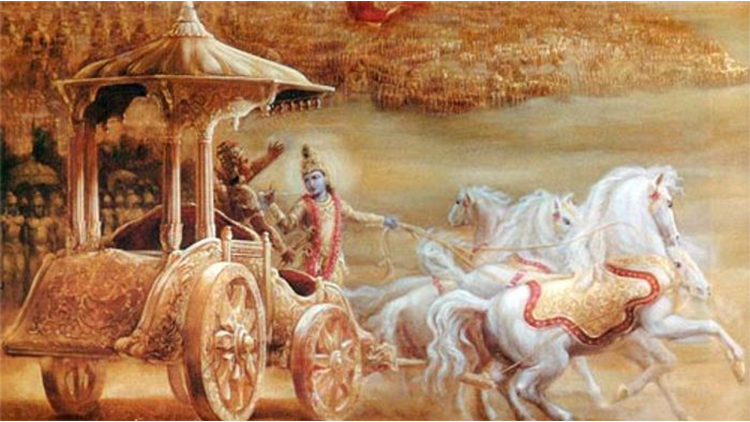The Chariot Driver
By Ananda Vrindavana Dasi | Дек 05, 2020

Perhaps one of the more endearing images in the Bhagavad-gita is Krishna, the Supreme Personality of Godhead, driving the chariot of His friend, the warrior Arjuna. When we accept the notion of God as a person then we can begin to ask, what does he do? How does he interact with us, and especially how does he interact with his pure devotees, such as Arjuna? Krishna chooses to be the chariot driver of Arjuna in the Battle of Kurukshetra where the Bhagavad-gita was spoken.
This role of charioteer gives us much insight into Krishna as a person. He enjoys serving those he loves, loves to sometimes lead from behind, loves to help his devotees succeed, loves to interact and be a part of making the world a better place.
For some, understanding God in such a personal way can be a bit unnerving. He acts too much like us, we might think, too ordinary. While there is a hint of truth and caution in that, we also understand that beyond the awe and reverence we have for the magnificence of the creator and the creation, there is a very sweet and personal relationship. This close and personal relationship with Krishna is the promise of bhakti – the love between God and us, and us and God.
Srila Prabhupada explains it well in his commentary on the Gita: “Although Lord Krishna is the Supreme Personality of Godhead, out of His causeless mercy He was engaged in the service of His friend. He never fails in His affection for His devotees, and thus He is addressed herein as infallible. As charioteer, He had to carry out the orders of Arjuna, and since He did not hesitate to do so, He is addressed as infallible. Although He had accepted the position of a charioteer for His devotee, His supreme position was not challenged. In all circumstances, He is the Supreme Personality of Godhead, Hrishikesh, the Lord of the total senses. The relationship between the Lord and His servitor is very sweet and transcendental. The servitor is always ready to render service to the Lord, and, similarly, the Lord is always seeking an opportunity to render some service to the devotee. He takes greater pleasure in His pure devotee’s assuming the advantageous position of ordering Him than He does in being the giver of orders. Since He is master, everyone is under His orders, and no one is above Him to order Him. But when He finds that a pure devotee is ordering Him, He obtains transcendental pleasure, although He is the infallible master in all circumstances.” Bg 1.21-22
Throughout the Gita, Krishna deals with Arjuna with much affection – first as a friend and then as a teacher. Besides that, as chariot driver, Arjuna naturally trusts and depends on Him. A good chariot driver sees things others may not, can prompt the right moves, and be there to encourage and support as the warrior makes difficult fighting decisions.
The Gita lets us observe the relationship between Krishna and Arjuna and hear their conversation. It’s a beautiful thing and at the end when Krishna tells Arjuna ‘deliberate on this fully, and then do what you wish to do’ we feel He is telling us that too. And we feel ready to take on our own life – more informed, more awake, more detached, and filled with more love.















